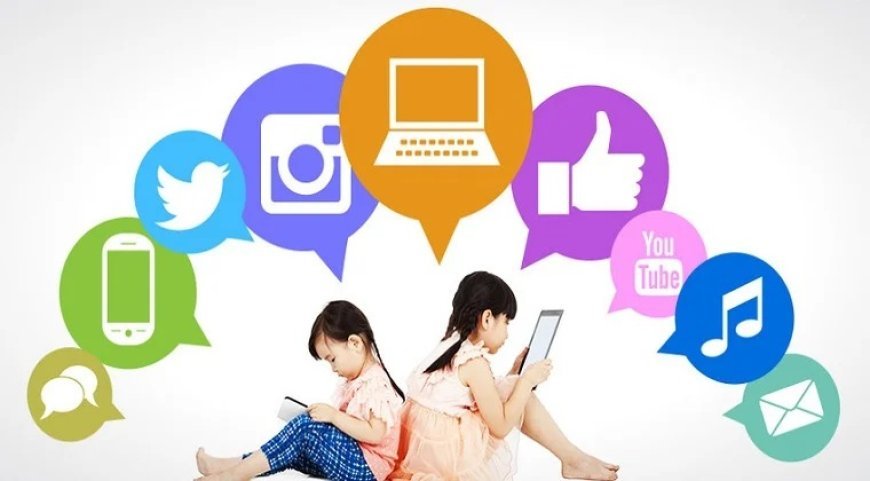The Dark Side of Social Media: What Parents Should Know About Kids Online
It feels like everyone is on social media these days, even young kids! While it might seem like a fun way to connect, for children aged 3 to 13, social media can have a "dark side."

It feels like everyone is on social media these days, even young kids! While it might seem like a fun way to connect, for children aged 3 to 13, social media can have a "dark side" that parents need to understand. These websites and apps are not really made for young children, and they can cause problems for their growing minds and feelings.
Let's talk about some of the ways social media can be tricky for our little ones.
1. Too Much Screen Time: Less Play, More Glow
When kids spend too much time looking at screens, they have less time for other important things. This means less time to:
- Play outside: Running, jumping, and exploring are super important for kids to grow strong bodies and learn new things.
- Talk to family and friends in person: Real conversations help kids learn how to share feelings, make friends, and understand people better.
- Sleep well: Looking at screens before bed can make it harder for kids to fall asleep and get the rest they need. Not enough sleep makes kids tired and grumpy!
The World Health Organization (WHO) and other experts say that for kids under 5, screen time should be very limited. For kids 6 and older, it's best to aim for less than 2 hours of fun screen time per day.
Read More: Aadhaar Now Mandatory for Tatkal Train Ticket Bookings: A Game Changer for Passengers
2. Seeing Things That Are Not Good for Them
Social media can be like a big, uncontrolled playground. Kids might stumble upon things that are:
- Scary or upsetting: Like videos of fights, sad news, or things that make them feel worried.
- Not true: Sometimes, things online look real but are just made up. This can confuse kids.
- Too grown-up: Content about violence, bad words, or things only adults should see can pop up unexpectedly.
- Unhealthy ideas: Kids might see pictures of "perfect" bodies or lifestyles that make them feel bad about themselves or their own lives.
Young children are not yet good at telling what's real and what's fake, or what's good for them and what's not.
3. Feeling Sad or Left Out (FOMO!)
On social media, people often share only the "best" parts of their lives. Kids might see:
- Everyone else having fun: Pictures of parties or playdates they weren't invited to. This can make them feel lonely or left out. This feeling is sometimes called "FOMO," which means "Fear Of Missing Out."
- People who look "perfect": When kids see lots of filtered photos, they might start to think they're not pretty or strong enough, which can make them feel bad about themselves.
- Mean comments or bullying: Sometimes, kids can be unkind online, saying hurtful things in comments or messages. This is called "cyberbullying" and can make kids feel very sad and scared.
4. Talking to Strangers: A Big No-No!
Social media makes it easy for anyone to talk to anyone else. This means:
- Strangers can try to talk to kids: These strangers might pretend to be friends or someone nice, but they might not be. They can try to get kids to share private things like their address or where they go to school.
- Sharing too much: Kids might not know what information is safe to share and what isn't. Posting pictures of their home, school uniform, or even their favorite park can be risky.
5. It Can Be Addictive (Like a Sweet Treat!)
Social media apps are made to be very interesting and hard to stop using. They give kids little "rewards" (like "likes" or new messages) that make them want to keep scrolling and playing. This can be like a sweet treat – a little is okay, but too much can make you feel unwell and want more and more!
What Can Parents Do to Keep Kids Safe?
It's important for parents to be like a friendly guide in the online world. Here are some simple things you can do:
- Talk, Talk, Talk: Have open chats with your kids about what they see online and how it makes them feel. Ask them about their favorite online games or videos.
- Set Clear Rules: Decide together when and how much screen time is allowed. Maybe no phones at dinner or before bed. Put these rules where everyone can see them, like on the fridge!
- Use Parental Controls: Many devices and apps have special settings that let you block bad content or limit screen time. Use them!
- Be a Role Model: Kids learn from you! If you're always on your phone, they'll want to be too. Show them that there's lots of fun to be had away from screens.
- Focus on Real Life: Encourage kids to play outside, read books, do crafts, and spend time with family and friends in person. These are the best ways for them to learn and grow!
- No Accounts for Young Kids: Most social media apps say you need to be at least 13 years old to have an account. It's there for a good reason – to protect children! It's best to stick to this rule.
By being aware and taking simple steps, parents can help their children enjoy the good parts of technology while keeping them safe from the dark side of social media. Remember, your child's well-being is the most important thing!
